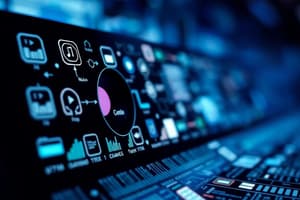Podcast
Questions and Answers
What is the primary focus of media literacy?
What is the primary focus of media literacy?
- To ignore media influences
- To simplify media messages
- To understand and evaluate media critically (correct)
- To consume as much media as possible
Which of the following components is NOT required for a communication process?
Which of the following components is NOT required for a communication process?
- Sender
- Message
- Recipient
- Context (correct)
How does information differ from data?
How does information differ from data?
- Information has no context, while data is meaningful.
- Information is processed output of data, while data is raw input. (correct)
- Information is raw input, while data is processed output.
- Information cannot change, while data varies.
What does information literacy entail?
What does information literacy entail?
What is the broader term that encompasses data, knowledge, and information?
What is the broader term that encompasses data, knowledge, and information?
Which of the following best describes knowledge?
Which of the following best describes knowledge?
What does media and information literacy equip citizens to do?
What does media and information literacy equip citizens to do?
From which Latin word does 'communication' derive its meaning?
From which Latin word does 'communication' derive its meaning?
What does technology literacy enable an individual to do?
What does technology literacy enable an individual to do?
Which of the following best describes digital literacy?
Which of the following best describes digital literacy?
What is a fundamental aspect of freedom of expression?
What is a fundamental aspect of freedom of expression?
Which characteristic is NOT typically associated with a responsible user of media and information?
Which characteristic is NOT typically associated with a responsible user of media and information?
What does professionalism in media production generally require?
What does professionalism in media production generally require?
What does being detail-oriented entail for media producers?
What does being detail-oriented entail for media producers?
Which of the following statements best represents critical thinking?
Which of the following statements best represents critical thinking?
What does being ethical in media and information imply?
What does being ethical in media and information imply?
Flashcards
Communication
Communication
The process of conveying meaning from a sender to a recipient using mutually understood signs, symbols, and rules.
Media
Media
The channels or methods used to communicate messages, often through physical objects like radio, television, or computers.
Data
Data
Raw input that becomes meaningful when processed or arranged.
Information
Information
Signup and view all the flashcards
Information Literacy
Information Literacy
Signup and view all the flashcards
Media Literacy
Media Literacy
Signup and view all the flashcards
Media & Information Literacy
Media & Information Literacy
Signup and view all the flashcards
Wisdom
Wisdom
Signup and view all the flashcards
What is Digital Literacy?
What is Digital Literacy?
Signup and view all the flashcards
What is Technology Literacy?
What is Technology Literacy?
Signup and view all the flashcards
What is Freedom of Information?
What is Freedom of Information?
Signup and view all the flashcards
What is Freedom of Expression?
What is Freedom of Expression?
Signup and view all the flashcards
What is the ability to communicate?
What is the ability to communicate?
Signup and view all the flashcards
What does being objective mean?
What does being objective mean?
Signup and view all the flashcards
What is being thorough?
What is being thorough?
Signup and view all the flashcards
What does being investigative mean?
What does being investigative mean?
Signup and view all the flashcards
Study Notes
Communication, Media, and Information Concepts
- Communication originated from the Latin word "communicare," meaning "to share."
- It involves conveying meaning using symbols, signs, and rules.
- Communication requires a sender, message, medium, and recipient.
- "Medium" or "channel" refers to the method used for communication (e.g., radio, TV, computers).
- Information is a broad concept encompassing data, knowledge, and experience.
- It's related to, but distinct from, data, knowledge, and wisdom.
- Data are raw input; information is the processed outcome.
- Knowledge is the understanding and awareness gained from information.
- Wisdom is the ability to make sound decisions using knowledge and experience.
Media Literacy
- Media literacy involves understanding and using media effectively.
- It includes critical thinking about media techniques and effects.
- It involves recognizing various media forms.
- This skill enhances the ability to analyze, evaluate, produce media.
Information Literacy
- Information literacy entails recognizing when information is needed.
- Locating, evaluating, organizing, using, and communicating information in various formats.
Media and Information Literacy
- Media and Information Literacy (MIL) focuses on critical skills for engaging with media and information.
- Fostering active participation in the community.
- Developing essential lifelong learning skills.
Technology Literacy
- Technology literacy involves employing technology appropriately and responsibly.
- Accessing, managing, integrating, evaluating, creating, and communicating information using tech tools.
Digital Literacy
- Digital literacy encompasses the ability to utilize digital technology.
- Includes location, evaluation, use, and creation of information using digital tools.
- It involves understanding diverse information formats and sources.
- Includes performing tasks in a digital environment.
Need for Media and Information Literacy
- Freedom of expression is a fundamental human right.
- Freedom of the press is vital for communities and civil society.
- Access to information is essential for citizens.
Responsible Media and Information Users
- Inquisitiveness and a desire to understand the world are necessary.
- Thorough general knowledge is important.
- Critical thinking skills help in evaluating claims and creating informed opinions.
- Effective communication skills are vital for conveying ideas clearly.
- Professionalism requires adhering to standards of behavior.
- Objectivity necessitates avoiding biases.
- Ethical conduct ensures consistency with right and wrong principles.
Media and Information Producers
- Investigative approach, meticulousness, detail-orientedness, and ability to engage creatively while producing media are important.
Media Habits, Lifestyles, and Preferences
- Media habits and preferences form the cornerstone of lifestyle.
- Understanding these elements helps in designing effective media strategies.
Learning from History and Beyond
- Important concepts and principles continue to shape media and information literacy in current times.
Studying That Suits You
Use AI to generate personalized quizzes and flashcards to suit your learning preferences.
Related Documents
Description
This quiz explores fundamental concepts of communication, including its definition, components, and the distinction between data, information, knowledge, and wisdom. It also covers the importance of media literacy in understanding and analyzing media effectively. Test your knowledge on how these elements interact in communication and media usage.




